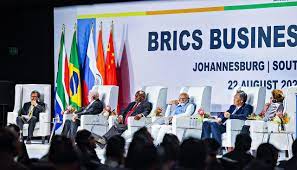
South Africa Eyes Stronger Ties and Trade with Russia Amid Global Uncertainties
As the world navigates through a labyrinth of geopolitical tensions and economic uncertainties, the bond between South Africa and Russia stands as a beacon of potential growth and cooperation. In a recent conversation with TASS, South African Ambassador to Russia, Mzuvukile Jeff Maqetuka, shed light on the evolving dynamics of this partnership, emphasizing the historical ties and mutual aspirations that pave the way for a strengthened alliance. With the backdrop of a changing global order, this relationship's implications stretch far beyond bilateral interests, touching on broader themes of economic independence and multipolarity.
Expanding BRICS: A Vision for Economic Independence
The BRICS coalition, representing some of the world's leading emerging economies, stands at a critical juncture. With discussions around expansion and the inclusion of new members such as Egypt, Ethiopia, Iran, and the United Arab Emirates, the alliance aims to redefine the global economic landscape. The expansion of BRICS reflects a collective endeavor to foster a more inclusive and multipolar global community, with the New Development Bank playing a pivotal role in financing sustainable development projects. Ambassador Maqetuka's insights into the potential growth of trade between South Africa and Russia within this framework underscore the strategic importance of BRICS in achieving economic independence and reducing reliance on dominant currencies.
Trade Dynamics and the Pursuit of Balance
The trade relationship between South Africa and Russia is marked by a commitment to mutual development and a keen interest in diversifying economic engagements. Despite Russia's overall trade surplus with South Africa, sectors such as agriculture and minerals witness a reverse trend, highlighting the dynamic nature of this trading partnership. The anticipated increase in trade volume in 2024, facilitated by transactions in national currencies, signals a shared vision to strengthen economic ties while navigating global market vulnerabilities. Moreover, the implementation of the MIR payment system in Russia and the potential adoption of a similar system in South Africa represent significant strides towards simplifying trade processes and enhancing financial cooperation within the BRICS framework.
Energy Cooperation and Diversification
Energy remains a pivotal area of cooperation between South Africa and Russia, with the former aiming to diversify its energy imports, currently dominated by Saudi Arabia and Nigeria. Ambassador Maqetuka's call for greater Russian participation in Africa's energy sector underscores the vast opportunities for collaboration, especially in light of South Africa's quest for alternative energy sources. This aligns with the broader BRICS agenda of fostering sustainable development and economic resilience among member countries, providing a fertile ground for Russian businesses to explore new ventures in the African market.
In conclusion, the dialogue between South Africa and Russia, as articulated by Ambassador Maqetuka, reveals a landscape ripe with opportunities for enhanced political and economic collaboration. Amidst the complexities of the current global scenario, this partnership not only seeks to bolster bilateral ties but also contribute to the overarching goal of creating a more balanced and multipolar world order. As the BRICS coalition continues to evolve, the role of South Africa and Russia within this framework will undoubtedly be a focal point for observers keen on understanding the future trajectory of global economic governance.
BNN
Source: bnnbreaking.com
